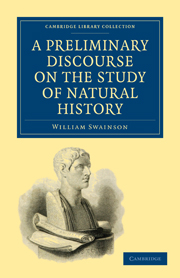Book contents
- Frontmatter
- Contents
- PART I RISE AND PROGRESS OF ZOOLOGY
- PART II ON THE GENERAL NATURE AND ADVANTAGES OF THE STUDY OF NATURAL HISTORY
- PART III OF THE PRINCIPLES ON WHICH NATURAL HISTORY RELIES FOR ITS SUCCESSFUL PROSECUTION, AND THE CONSIDERATIONS BY WHICH THE NATURAL SYSTEM MAY DE DEVELOPED
- CHAP. I
- CHAP. II
- CHAP. III
- CHAP. IV
- CHAP. V
- CHAP. VI
- PART IV ON THE PRESENT STATE OF ZOOLOGICAL SCIENCE IN BRITAIN, AND ON THE MEANS BEST CALCULATED FOR ITS ENCOURAGEMENT AND EXTENSION
- APPENDIX
- INDEX
- Frontmatter
- Contents
- PART I RISE AND PROGRESS OF ZOOLOGY
- PART II ON THE GENERAL NATURE AND ADVANTAGES OF THE STUDY OF NATURAL HISTORY
- PART III OF THE PRINCIPLES ON WHICH NATURAL HISTORY RELIES FOR ITS SUCCESSFUL PROSECUTION, AND THE CONSIDERATIONS BY WHICH THE NATURAL SYSTEM MAY DE DEVELOPED
- CHAP. I
- CHAP. II
- CHAP. III
- CHAP. IV
- CHAP. V
- CHAP. VI
- PART IV ON THE PRESENT STATE OF ZOOLOGICAL SCIENCE IN BRITAIN, AND ON THE MEANS BEST CALCULATED FOR ITS ENCOURAGEMENT AND EXTENSION
- APPENDIX
- INDEX
Summary
(191.) We have already explained, and familiarly illustrated, the two sorts of relations which natural objects bear to each other, and which are distinguished by the terms Analogy and Affinity. The prevalence of these relations is so universal throughout nature, that there is no group of beings, however small, which does not present them. Nay, we question not that every individual species has its analogies, as it certainly must have its affinities. In a future volume we propose to enquire more particularly into these relations, and to bring forward such instances of their prevalence, as to sanction the hypothesis that they are uniform, constant, and universal in every part of the animal creation. In regard to affinities, indeed, this truth is self-evident; because, whatever forms part of a series, must of necessity have affinities, and these must be of different degrees. But, in regard to analogy, the case is different, and calls for a much more extended enquiry. On the present occasion, however, we shall merely consider those arguments which may be used, à priori, in favour of the supposition that analogies are, in the most comprehensive sense of the word, universal; and that they consequently assume an importance of the highest order when applied to illustrate, and to confirm, any theory on the variation of animal structure.
(192.) In the first place, it is unnecessary to enforce the axiom long established by sound philosophy, that natural and moral truths are but parts of the great system of nature.
- Type
- Chapter
- Information
- A Preliminary Discourse on the Study of Natural History , pp. 282 - 295Publisher: Cambridge University PressPrint publication year: 2009First published in: 1834



